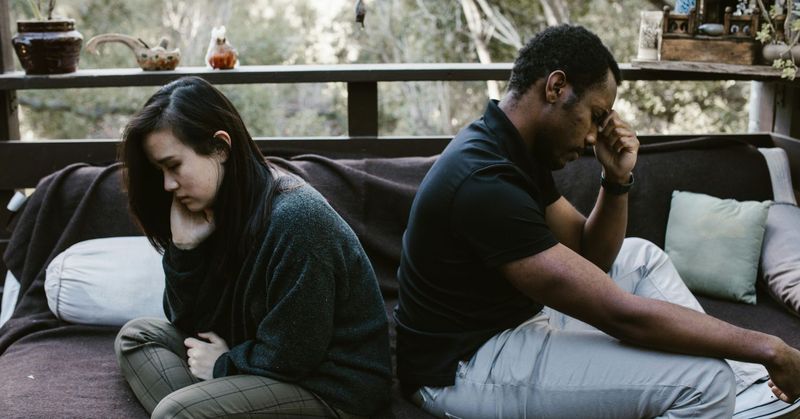17 Brutally Honest Insights From Experts on Why Marital Hatred Happens
Let’s cut through the polite small talk and wedding-filtered nostalgia: Marital hatred is real. It creeps in slowly, then all at once—turning shared beds into battlegrounds and once-sweet glances into eye rolls so sharp they could slice glass. It’s not always loud. Sometimes it’s quiet. Like sighs instead of kisses.
Silence instead of fights. Distance instead of rage. Here are 17 brutal, eye-opening insights from relationship experts about why marital hatred happens—and why it’s not always about one “bad guy” but the emotional rot that festers in the silence between two people who stopped trying.
1. Unspoken Resentment Builds Faster Than Anyone Thinks

It starts with the socks on the floor. But soon it’s you always expect me to pick up your mess, and that turns into you don’t see me at all. Resentment is a slow poison—and it’s shockingly easy to ignore until it’s lethal.
Ever realize you’re silently tallying up all the little things you never say? That’s resentment doing its work in the background. It turns every minor annoyance into a mental receipt that nobody ever pays.
The scariest part? Sometimes you can’t see it until your patience snaps. Suddenly everything your partner does feels like a personal attack. Experts say naming resentment out loud, even if it feels petty, is the only way to stop it from burying love alive.
2. Emotional Neglect Feels Like Rejection—Every Single Day

When one partner stops checking in, showing interest, or making time, it doesn’t feel neutral. It feels like abandonment with a smile. That quiet shift in attention hurts more than most fights ever could.
You start second-guessing your worth and replaying old conversations to spot what you missed. Emotional neglect is sneaky; it’s the loneliness that settles in even with someone next to you on the couch.
Sometimes you wonder if you’re asking for too much. But here’s the truth: We all need to be seen and heard. When that’s missing, it’s not just sadness—it’s that sharp sting of being rejected by the person who once promised to choose you every day.
3. Small Betrayals Add Up Faster Than Big Ones

It’s not always cheating. Sometimes it’s promises broken. Support withheld. Needs dismissed. And eventually? You stop trusting anything they say.
Tiny cracks appear when you’re let down about the little stuff—like them forgetting your birthday, or not standing up for you in front of others. Each moment chips away at your faith in the relationship.
Before you know it, you’re keeping score and holding back. Trust isn’t lost in explosions, but in a hundred tiny silent cuts. Experts see these as the real danger zones—the ones no one talks about until it’s way too late.
4. Communication Dies Long Before Love Does

Most couples don’t hate each other out of the blue—they just haven’t had a real, safe, honest conversation in years. Silence breeds assumptions. Assumptions breed distance. And distance? Kills intimacy.
You remember when talking was easy, right? When every little thing felt worth sharing. Now, it’s like you’re walking on eggshells, hoping the wrong word won’t set off a fight—or, even worse, a wall of silence.
A marriage expert once told me: “Couples don’t fall apart when they fight. They fall apart when they stop talking.” And if that silence grows, well… so does the space between you.
5. One (or Both) People Are Living With Unhealed Childhood Wounds

You’re not arguing about dinner. You’re reliving how your dad ignored you or how your mom made love conditional. Old pain disguised as present tension.
Ever snapped at your partner and wondered why it felt so familiar? Chances are, you’re reacting to wounds that have nothing to do with the person in front of you. That baggage is heavy, and it doesn’t unpack itself.
Therapists say couples drag childhood hurts into their marriages all the time. The trick is spotting when it’s happening—and admitting that maybe, just maybe, you both need help healing the past so it stops poisoning the present.
6. Intimacy Becomes a Chore, a Weapon, or a Ghost

When physical intimacy becomes a tool of guilt, pressure, or avoidance, it doesn’t just fade—it festers. And hatred finds its way into that void.
At first, you might convince yourself it’s normal for things to cool off. But when intimacy turns into a bargaining chip or something you both avoid, it stops being a source of comfort. Instead, it’s a reminder of everything that’s wrong.
I once heard someone say that the bedroom tells the truth no one else sees. And honestly? When that space is cold, it’s rarely just about intimacy. It’s about connection, vulnerability, and whether you’re safe with each other at all.
7. There’s No Emotional Safety—Only Performance

If you feel like you have to “be careful,” “act calm,” or “not set them off”… you’re not in a relationship. You’re in emotional survival mode. And nobody can love from there.
Walking on eggshells is exhausting. You end up monitoring every word—never sure what will spark the next blowup or silent treatment. That anxiety? It lingers long after the conversation is over.
Experts say emotional safety is the foundation for real love. When you lose it, you lose everything that made being together feel safe and soft. And hatred grows where you once felt at home.
8. Control Replaces Care

What starts as “I’m just trying to help” becomes micromanaging. One partner becomes a parent. The other becomes a child. Resentment follows fast.
Suddenly every decision becomes a debate, and freedom feels like something you have to ask for. It’s smothering—and it’s not love. It’s power, dressed up as concern.
A relationship coach once told me that love is freedom, not a leash. When care turns into control, even well-intentioned actions start to feel like traps. And nobody likes feeling trapped, especially in their own marriage.
9. You Stop Celebrating Each Other’s Wins

If your partner’s joy makes you feel left behind—or invisible—that’s not a small issue. That’s emotional competition instead of connection.
When was the last time you cheered for each other? If you can’t remember, that’s a problem. Sharing victories used to feel like a team sport; now it’s more like a rivalry where nobody wins.
Therapists say couples who stop celebrating together are already halfway to resentment. Joy turns sour, and soon even the best news feels like salt in the wound. Supporting each other’s growth is non-negotiable if you want to keep the love alive.
10. You Don’t Fight Fair—You Fight to Win

It’s not about solving the problem. It’s about being right. And every fight becomes a courtroom where one of you leaves guilty and the other leaves smug.
Arguments that escalate into scorekeeping or personal attacks leave scars that don’t heal. Instead of working together to find answers, it’s like you’re opponents in some endless debate club.
A marriage counselor once said, “Fights should be for the relationship, not against it.” If every disagreement is a battle for dominance, you’ll forget why you loved each other in the first place.
11. You Don’t Like Who You Are Around Them Anymore

This one cuts deep. When the relationship brings out your worst self, it’s only a matter of time before hatred points inward—and then outward.
You catch yourself saying things you’d never say to anyone else. Or you feel like you have to shrink, hide, or toughen up just to survive the day. That’s not who you want to be—and it gnaws at your spirit.
Therapists call this “relationship-induced self-loss,” but all you know is you want the old you back. If your marriage makes you dislike yourself, pay attention. That’s not just a red flag—it’s a fire alarm.
12. The Friendship Dies Before the Romance Does

You can’t be lovers without being allies. When you stop laughing, sharing dumb inside jokes, or supporting each other’s weird obsessions? Love starts to suffocate.
Remember the days when you were best friends first? Somewhere along the way, the laughter fades and the shared hobbies turn into solo acts. That’s when the loneliness really sets in.
A relationship expert said the best marriages are built on friendship. When that foundation cracks, the romance doesn’t stand a chance. If you’re not friends anymore, you’re strangers with shared bills.
13. Emotional Labor Isn’t Shared—And It Shows

When one partner is the planner, the feeler, the fixer, the organizer, the glue… they also become the one who burns out. And hatred grows in exhaustion’s shadow.
You know the score: remembering birthdays, planning holidays, managing everyone’s moods—it’s emotional labor, and when it’s one-sided, it’s brutal. It builds invisible walls no one else can see.
Experts say unshared emotional work is one of the sneakiest marriage killers. If you’re always the one holding it all together, resentment is just waiting in the wings. And honestly? It’s not sustainable.
14. One (or Both) Partners Resent the Life They Built Together

The job, the kids, the house—they’re all things you chose. But if you feel trapped by those choices and blame your partner for “making you” settle, it gets ugly—fast.
Suddenly every school pickup or late-night bill feels like a weight tied to your ankle. Instead of feeling like teammates, you feel like co-prisoners in a life you didn’t truly agree to.
A family therapist told me that regret can turn into resentment if you aren’t honest about it. If you start wishing for a do-over, address it before the bitterness becomes the loudest voice in the room.
15. There’s No Room to Grow Without Fear

If your partner’s growth feels threatening, or you outgrow who you both were at the start, you either grow together—or apart, with quiet bitterness between every breath.
It takes guts to reinvent yourself, but it takes even more courage to let your partner change without feeling left behind. If you’re afraid to be ambitious, vulnerable, or different because it might upset them, resentment festers fast.
Therapists say couples who thrive root for each other’s growth. When that’s missing, you start hiding achievements or shrinking dreams. Growth shouldn’t feel risky in a marriage; it should feel celebrated.
16. Unrealistic Expectations Set You Up to Fail

You thought marriage would fix the loneliness. Fill the hole. Save you. But your partner isn’t your therapist, your savior, or your self-worth. And when they disappoint that fantasy, resentment explodes.
Romantic comedies lie—nobody is perfect, and “happily ever after” takes real work. Unrealistic expectations create a finish line nobody can ever reach, and everybody ends up losing.
Relationship pros say naming your expectations out loud keeps them from turning toxic. If you’re upset that reality doesn’t match the daydream, talk about it before you start tallying up disappointments you never voiced.
17. Love Becomes Obligation—And Nothing Feels Free Anymore

When every touch feels earned, every favor feels transactional, and every “I love you” feels like a box to check… you’re not loving anymore. You’re managing. And no one feels safe in that space.
The warmth and spark turn into routine and duty. You start to notice that affection comes with strings attached, and kindness feels less like a gift and more like a requirement. That’s not love—it’s a contract, and contracts have loopholes.
Counselors say that when love becomes another task on your endless list, resentment is quick to follow. Authentic affection isn’t measured or weighed. It’s given—and that’s what keeps hate at bay.







